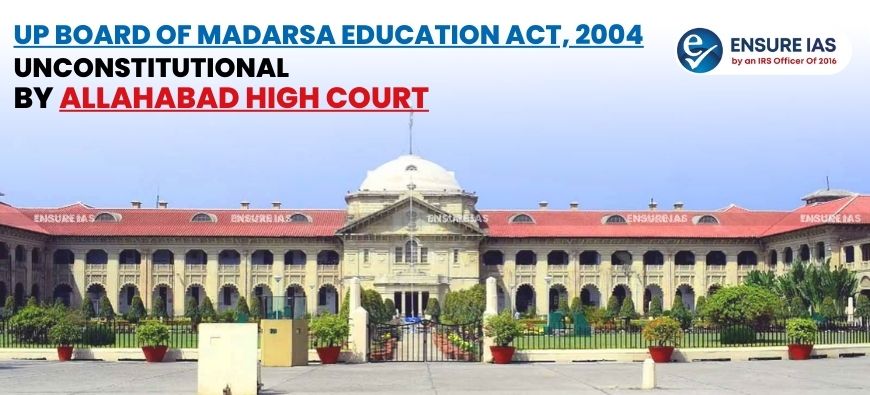- Courses
- GS Full Course 1 Year
- GS Full Course 2 Year
- GS Full Course 3 Year
- GS Full Course Till Selection
- Answer Alpha: Mains 2025 Mentorship
- MEP (Mains Enrichment Programme) Data, Facts
- Essay Target – 150+ Marks
- Online Program
- GS Recorded Course
- Polity
- Geography
- Economy
- Ancient, Medieval and Art & Culture AMAC
- Modern India, Post Independence & World History
- Environment
- Governance
- Science & Technology
- International Relations and Internal Security
- Disaster Management
- Ethics
- NCERT Current Affairs
- Indian Society and Social Issue
- NCERT- Science and Technology
- NCERT - Geography
- NCERT - Ancient History
- NCERT- World History
- NCERT Modern History
- CSAT
- 5 LAYERED ARJUNA Mentorship
- Public Administration Optional
- ABOUT US
- OUR TOPPERS
- TEST SERIES
- FREE STUDY MATERIAL
- VIDEOS
- CONTACT US
UP Board of Madarsa Education Act, 2004
UP Board of Madarsa Education Act, 2004
16-05-2024

The Allahabad High Court (HC) has declared the Uttar Pradesh Board of Madarsa Education Act, 2004 as unconstitutional.
About the Act
- Aim: The Act aimed to regulate and govern the functioning of madrasas (Islamic educational institutions) in Uttar Pradesh.
- Framework: It provided a framework for the establishment, recognition, curriculum, and administration of madrasas across Uttar Pradesh.
- The Act created the Uttar Pradesh Board of Madarsa Education to supervise and oversee madrasas in the state.
- Madrassa education, according to the act, includes instruction in Arabic, Urdu, Persian, Islamic studies, Tibb (traditional medicine), philosophy, and other specific subjects.
- Degrees and Diplomas: The Madarsa Education Board grants undergraduate and postgraduate degrees called Kamil and Fazil, respectively.
- Diplomas issued by the board are known as Qari, and it also issues certificates and other academic honors.
- Examinations: The board conducts exams for courses like Munshi and Maulvi (Class X) and Alim (Class XII).
- Responsibilities of the Board: Specifying the curriculum, textbooks, reference books, and other teaching materials for various courses including Tahtania, Fauquania, Munshi, Maulvi, Alim, Kamil, and Fazil.
Concerns Regarding the Act:
- Constitutional Violation: The Allahabad High Court found the Act to be unconstitutional because it promotes education based on religion, which goes against India's principle of secularism and fundamental rights.
- The Court said the Act found to be a violation of secularism.
- The state has no power to create a board for religious education or to establish board for school education only for a particular religion and philosophy associated with it.
- It is the duty of the state to provide education, which is secular in nature, more particularly for minors, that is children up to the age of 18.
- It cannot discriminate and provide different types of education to children belonging to different religions.
- Quality Education: The Act failed to ensure mandatory education up to the age of 14, as required by Article 21 A of the Constitution.
- Exclusion from RTE Act: There were concerns that madrasas being excluded from the Right to Education (RTE) Act, 2009 could deny students access to universal and quality school education.
- Limited Curriculum: The court found that madrasa syllabi heavily focused on Islamic studies, with minimal emphasis on modern subjects.
- Students were required to study Islam and its doctrines to progress, with modern subjects often included as optional or offered minimally.
- Conflict with Higher Education Standards: The Act was seen to conflict with Section 22 of the University Grants Commission (UGC) Act, 1956, raising questions about its compatibility with higher education standards.
Constitutional Provisions for Education in India
Initiatives Related to Education
|



